Why Is My Air Conditioner Leaking Water? – Causes And Solutions
An air conditioner can start leaking due to various factors like clogged condensate drain line, low refrigerant levels, broken condensate pump etc. Maintaining your AC unit by replacing air filters and cleaning clogs can help prevent leaks. As frustrating as it may seem, AC leaks are a common problem that most owners would have to […]
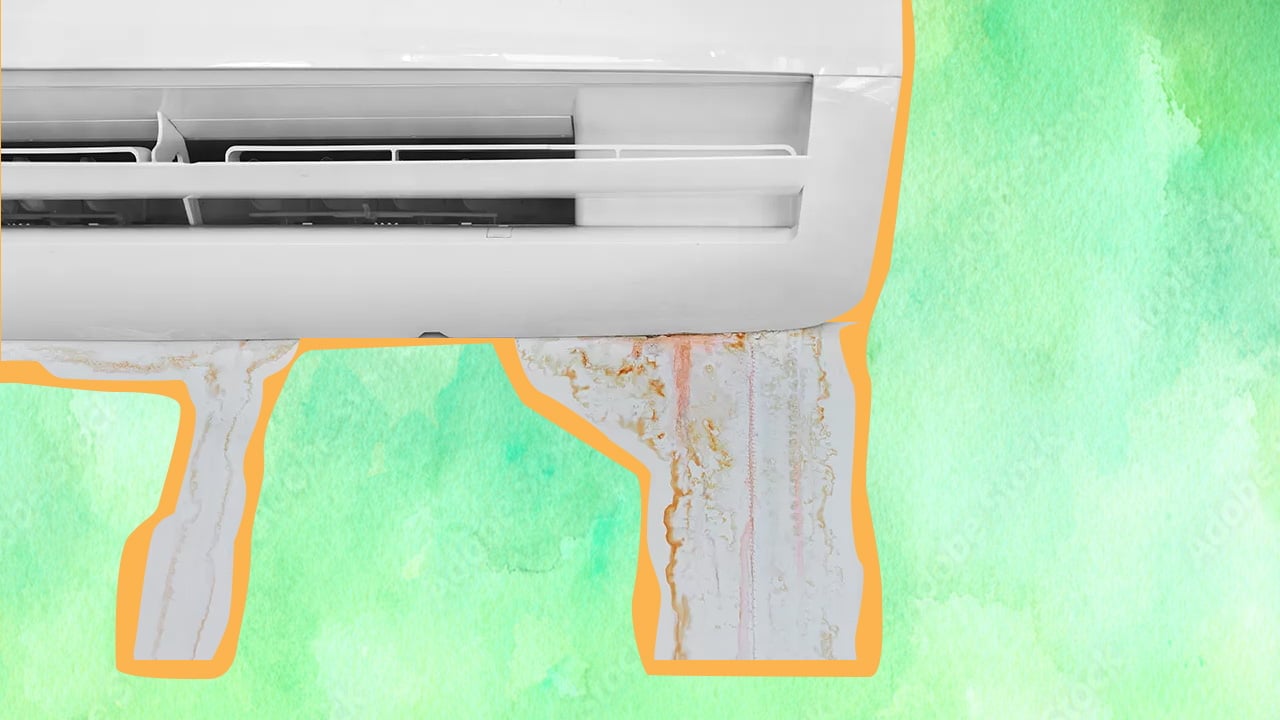
An air conditioner can start leaking due to various factors like clogged condensate drain line, low refrigerant levels, broken condensate pump etc. Maintaining your AC unit by replacing air filters and cleaning clogs can help prevent leaks.
As frustrating as it may seem, AC leaks are a common problem that most owners would have to deal with. Fortunately, the fixes for these problems are pretty simple.
Before I discuss the solutions, understanding what caused the leak is essential. There are 5 major reasons why your air conditioner might be leaking, so let’s take a look at them in detail.
Possible Causes For A Leaking AC
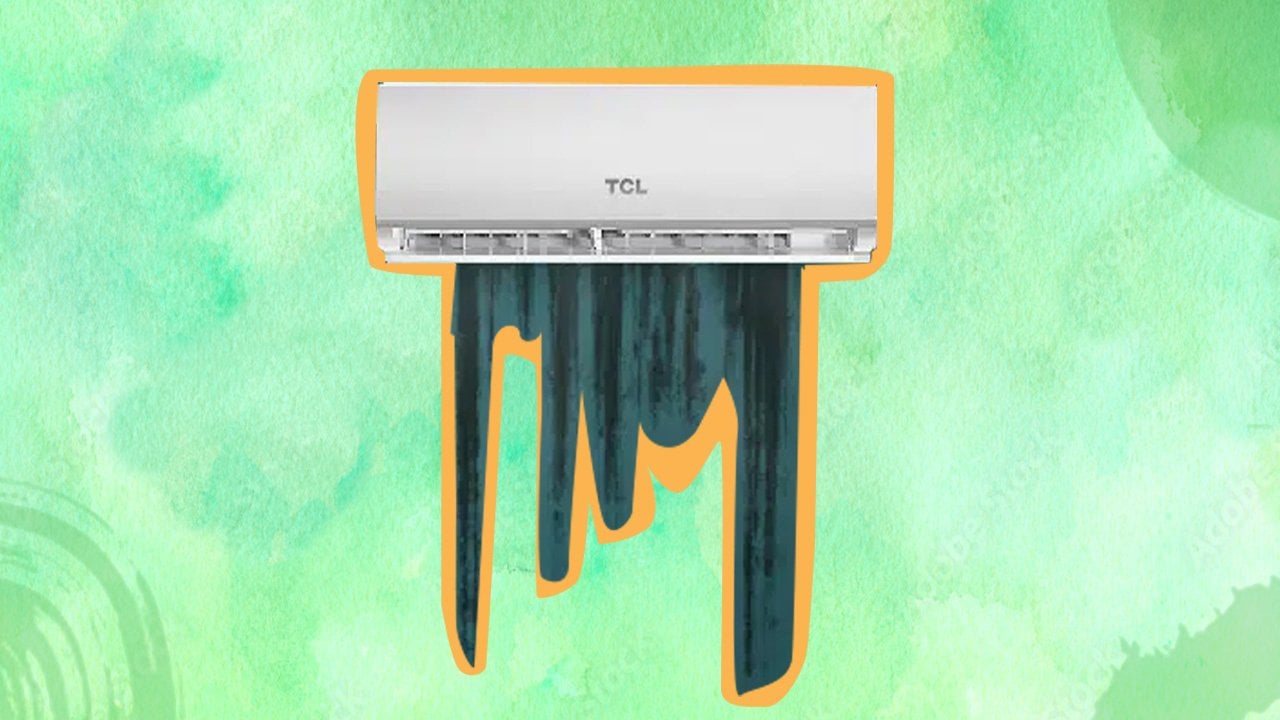
The most commonly asked question when it comes to AC units is “why is my AC unit leaking water?” There are several reasons as to why water leaks may occur, but these reasons are the most common.
1. Clogged Condensate Drain

Source: Supertech HVAC
A clogged condensate drain line is one of the predominant causes of your air conditioner leaking water. Typically, a condensate drain line is used to carry the accumulated water out of the air conditioning system.
When there is a buildup of dirt, mold, dust, or other small particles, it can cause a clog. The clog then blocks the water, which eventually leaks into your home.
To prevent condensate drain pipes clogging, regular cleaning and maintenance can help. If the blockage worsens, contacting an HVAC professional to clear the accumulated debris would be ideal.
2. Low Refrigerant Levels

Source: Supertech HVAC
When there is not enough refrigerant in the air conditioning unit, it can lower the pressure within the system and result in a refrigerant leak. The most telltale sign of inadequate refrigerant levels is when the temperature drops and the AC does not cool as efficiently as before.
Low refrigerant levels can cause the evaporator coil within the system to freeze. An evaporator coil converts the liquid in the air conditioner into vapor, which is then expelled into your room to cool it down.
A lack of refrigerant in the air conditioning unit will prevent the evaporator coil from powering up. This results in the evaporator coil freezing with time and the frozen coil eventually melting, thus causing a leak in the air conditioner.
Yet another sign of low refrigerant levels is if you hear any hissing or bubbling sound from the unit. Based on the intensity of the damage, a professional might recommend either a minor repair or a total replacement of the air conditioner.
3. Damaged Drain Pan

Source: Supertech HVAC
The drain pan of the AC system is located right beneath the evaporator coils. If and when there is any condensation in the unit, the drain pan, as the name suggests, catches it all.
In case of a damaged or rusted drain pan, the condensation will not be collected properly and falls right through it, leaking water into your home. If your AC has a damaged drip pan, it is recommended that you replace it with a new one immediately.
4. Broken Condensate Pump

Source: Supertech HVAC
Since there is a significant amount of condensation inside the air conditioning system, it must be directed outside the machine. This is done by the condensate pumps that pump the water out to prevent the AC leaking water inside your home.
When the condensate pump is damaged, all the excess water is collected in the drip pan, which will overflow when it is full and ultimately causing a water leak. Though it is possible to repair the condensate pump, a licensed technician will have to inspect the system before proceeding further. Often, a replacement of the entire condensate pump is necessary to fix a leaking AC unit.
5. Dirty Air Filters
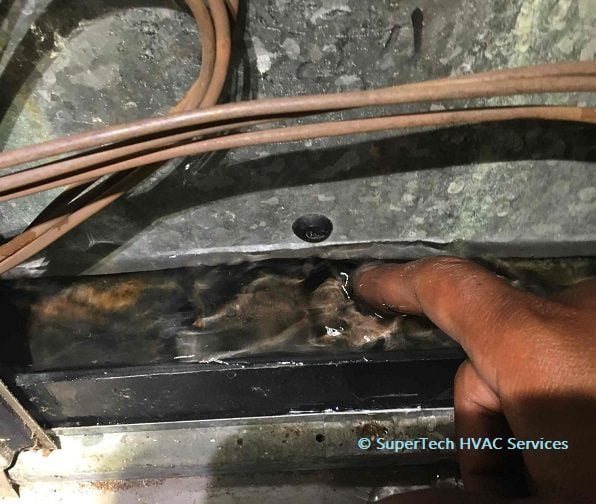
Source: Supertech HVAC
An air conditioning unit is not only required to expel cold air but also healthy and clean air. Apart from being a major health hazard, a dirty air filter can result in a leak in the AC system.
Irrespective of the type of AC you own, window or portable, cleaning the air filter is mandatory. Furthermore, a dirty air filter can limit airflow quality and prevent the evaporator coils from getting the necessary ventilation to function optimally.
When the air filter is left uncleaned for an extended period of time, it can cause severe health problems for your family and become an inconvenience. The best way to ensure this does not occur is to clean the filter every month or two and replace any damaged or dirty filters as soon as possible.
Signs Of An AC Unit Leaking Water

Source: Supertech HVAC
If there is a leak within your air conditioner, it usually means that something is disrupting the normal cooling process.
The moment you notice puddles of water being formed on the floor of tower air conditioners, there might be leaks. On the other hand, attic or ceiling AC units may flood the ceiling or result in water leaking down the walls.
Yet another sign of leaking air conditioners is the smell of mold. Mold thrives in moisture, and a leak provides just that, so if the leak is left untreated long enough, it can become a breeding ground for bacteria and mold.
Solutions For An Air Conditioner Leaking Water
If you’ve been seeing signs of leaks within your AC and want to get it fixed yourself, I’ve got you covered. Here are some simple ways to fix an AC leaking water.
1. Replace Air Filters
Replacing the dirty air filter within an AC is the most feasible solution for an AC leaking water. If you haven’t been maintaining the filters properly or suspect they are damaged, changing them will be beneficial. Air filters are also pretty affordable when compared to repairing or replacing the entire AC unit.
2. Clean The Clogged Condensate Drain Line
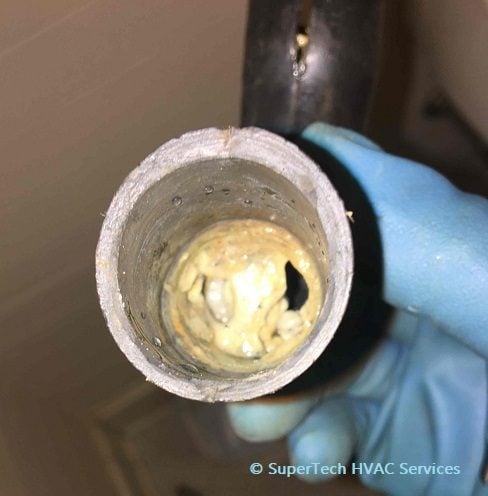
Source: Supertech HVAC
Initially, you will have to inspect the condensate drain line for a clog. This can be done by shutting the entire system down and opening it up until the drain line is visible.
Remove the PVC cap covering the drain line to spot the clog. Once you’ve spotted the blockage, use a long wire brush and scrub the clogged drain line to clear it.
Close the AC unit once you’re done, plug the system back, and you’re good to go.
3. Find Drain Pans That Fit The Unit
As mentioned, the best way to solve a rusted or damaged drain pan problem is by replacing the existing drain pans. However, a common misconception people have is that any drain pan will work for all types of air conditioners.
This is not true, as all this does is result in the unit having a drain pan that doesn’t fit, which in turn causes further leakage due to its inability to collect water properly.
4. Bleach Drain Lines Half Yearly
Bleaching the drain lines is more of a preventative measure rather than a fix. An ideal way to ensure your air conditioning unit functions optimally without any leaks is to clean it regularly.
Pouring bleach down the clogged drain line can clean it and remove any unwanted debris or gunk that may cause a clog. Additionally, the chemicals in bleach can kill harmful microorganisms which may promote algae or mold growth.
5. Refrain From Using The AC Excessively On Hot Days
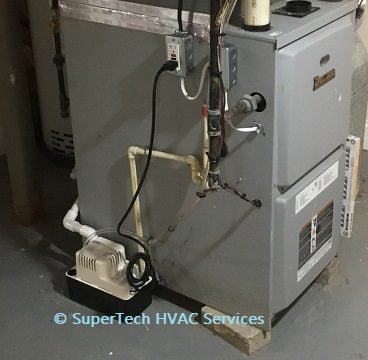
Source: Supertech HVAC
As tempting as it may be to use the air conditioner constantly on hot summer days, it can only cause harm to the device in the long run. To prevent this from happening but also cool your home efficiently, setting the temperature to a medium range would help minimize strain.
When the temperature is not too low or high, the device doesn’t have to work as much while converting the warm air into cold air.
Preventative Measures For An Air Conditioner Leaking Water
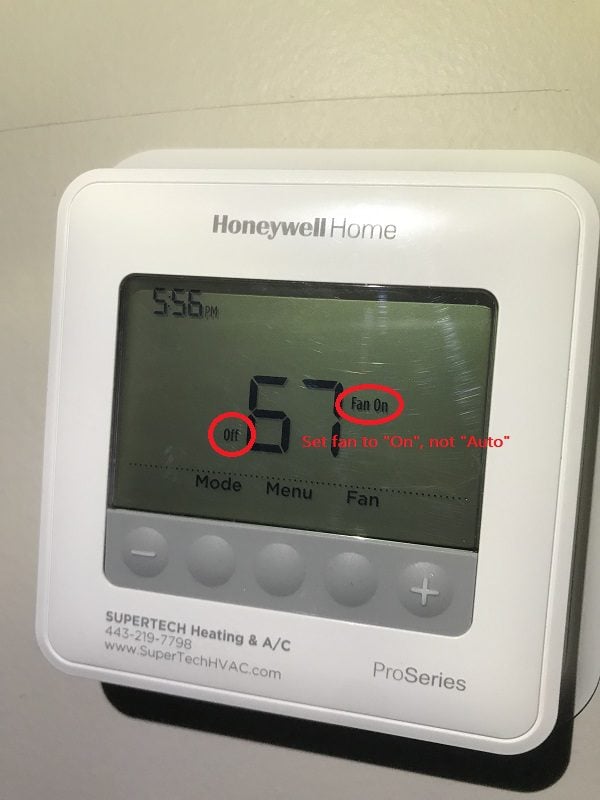
Source: Supertech HVAC
The first and foremost step is to maintain the air filter regularly and a properly cleaned air filter can minimize the chance of your air conditioner leaking water. Most air filters are detachable, so you can just slide them out and clean them using water, dish soap, or a handheld vacuum.
Tip
Ensure that the air filter is completely dry before you put it back in to avoid mold growth. Secondly, contacting a professional to inspect your AC unit every once in a while is beneficial. This will help identify any potential problems within the AC unit and rectify the issue before matters get worse.
The ideal time to get an air conditioner inspected is around spring, just before summer begins. However, if you hear buzzing sounds from the device, contact a professional as soon as possible.
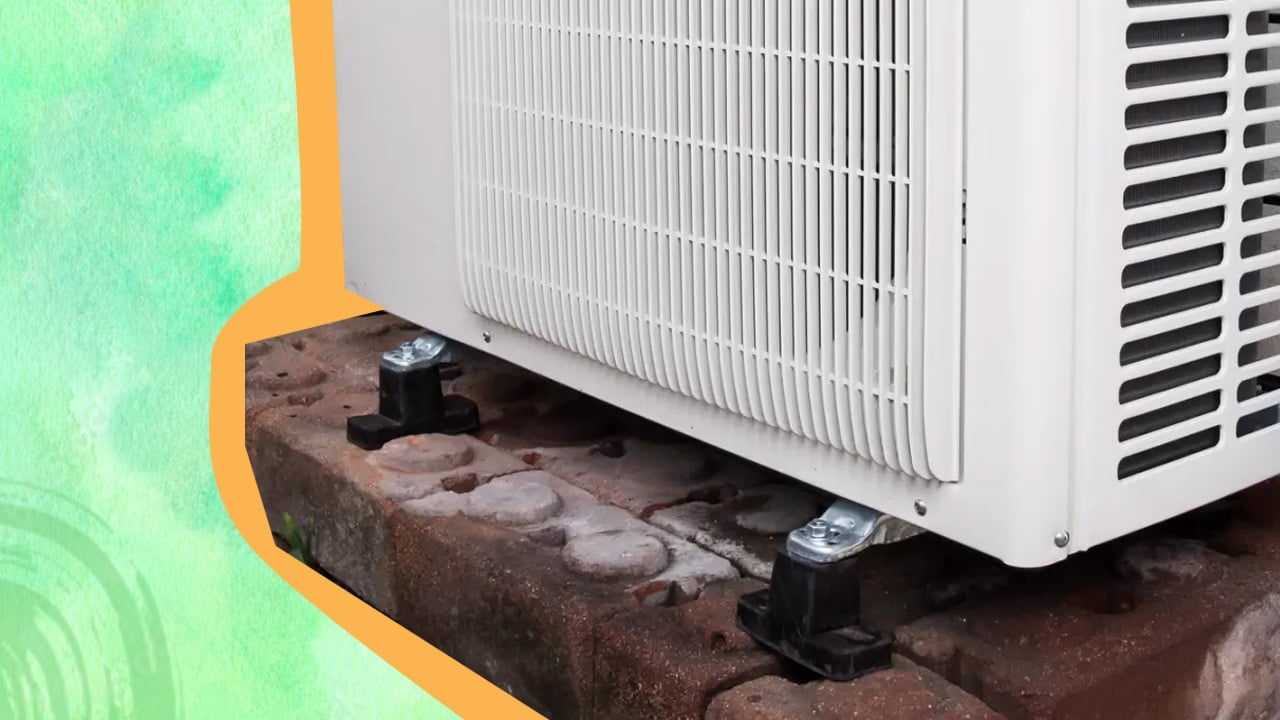
Final Words
Now that you know the reasons for an air conditioner leaking water, it is time to take action to fix it as well as prevent it from happening again. With summers becoming more unbearable, an inefficient air conditioner is the last thing anybody would want.
To get through these hot days, ensure your device is properly maintained and serviced. However, if the leaks aren’t resolved after you try the above-mentioned steps, feel free to contact a professional immediately.
